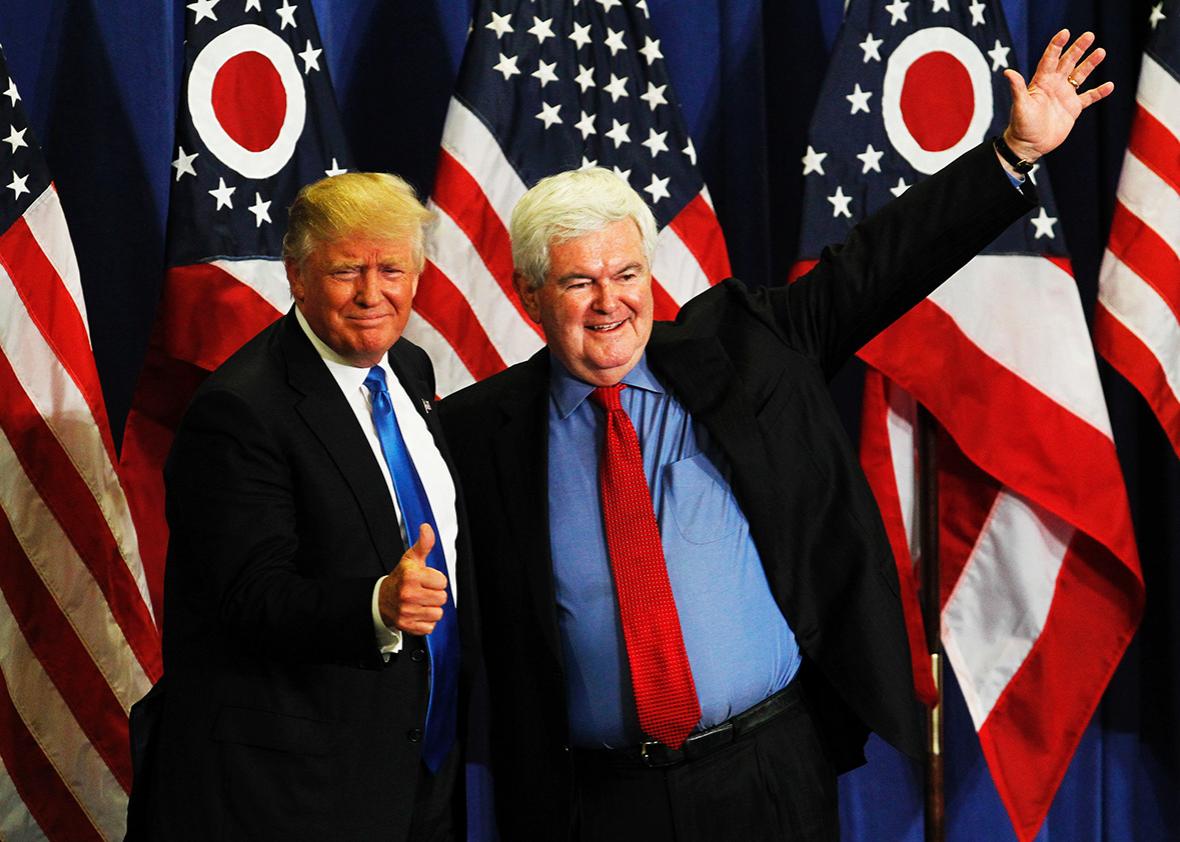Here’s something funny: Republicans are going to try to change Donald Trump. Again. They are going to try to discipline him. This is what they’re going to do, in some way or another, because they think they can still do it. It is August 2016, and there are three months until Election Day.
They’re going to give it what we’d like to think is one last go, but almost certainly is not. NBC News reported Wednesday morning that a “candidate intervention” is in the works. “Republican National Committee head Reince Priebus, former Republican New York City mayor Rudy Giuliani and former House Speaker Newt Gingrich,” Chuck Todd and Hallie Jackson write, “are among the Trump endorsers hoping to talk the real estate mogul into a dramatic reset of his campaign in the coming days.” (Chris Christie is reportedly not participating because he’s still mad, for whatever reason, that he wasn’t selected as aide-de-camp on this doomed mission.) This “group of GOP heavyweights,” they write with exceeding generosity, is also trying to rope Trump’s kids into the talking-to. It comes after a roughly 48-hour period in which Trump screwed up in a dozen or so different ways—most egregiously, to top GOP minds, by refusing to back House Speaker Paul Ryan in his primary against some nut.
The Trump campaign through official channels is denying that anything whatsoever is wrong, and Crooked Hillary will soon be toast. Gingrich says there’s no plan for a “formal intervention” while vice presidential nominee Mike Pence says he’s “never heard anything about a meeting of that kind.” Priebus was reportedly so “apoplectic” Tuesday night, following Trump’s comments on Ryan, that he made several sternly worded phone calls to Trump’s staff. If you push Reince Priebus far enough, he may even go so far as to write a sternly worded letter.
The imagery of the “formal” intervention is a little misleading. It’s not going to be five or 10 principals sitting in a room, furrowing their brows and telling Trump in soft voices to stop being mean. It’s going to be dozens of principals having small meetings and phone conversations among themselves, or making selective leaks to the press, trying to pass some sort of message to Trump himself that his behavior this week has been unacceptable.
Trump can change, temporarily, when his back is against the wall. After his disastrous performance in the Wisconsin primary, he kept his mouth shut for a week and returned to form in the ensuing Northeastern primaries. When Trump was waging his campaign against Judge Gonzalo Curiel, murmurs began anew that GOP brass might withdraw its support en masse or consider nominating another candidate at the convention if Trump didn’t zip it. So when Trump spoke in prime time following the June 7 primaries, he stuck to the ’prompter and read a snoozer, incident free. Priebus was pleased, Trump managed to go a few weeks without egregiously insulting everyone in his party and the United States of America. Attention turned to other controversies—shootings, the controversial cessation of Hillary Clinton’s FBI probe—and he made the safe, party-unifying selection of Mike Pence as his running mate. He was nominated.
Did Trump take his nomination to mean that he was unconstrained? The morning after his acceptance speech, he was at a press conference delivering an encore of his just-askin’-questions routine regarding Ted Cruz’s father and the assassination of John F. Kennedy. Since the Democratic convention he has repeatedly criticized the parents of a slain soldier, because he is constitutionally incapable of not taking the bait. Tuesday’s summoning of the Washington Post for an interview in which to exert dominance over Paul Ryan and John McCain wasn’t controversial among elected Republicans because Ryan and McCain were desperately in need of his help. It was controversial because it showed that, given a choice between pursuing petty personal agendas and the sort of dull transactional politics that leaders rely on to build team trust, Trump will always pursue his reality-show grudges.
They’ll probably get the message to Trump, temporarily. Some threats about withdrawing party support en masse—in terms of both endorsements and money—may get tossed around. They’ll show Trump some numbers about what his attacks on the Khans are doing to his standing in the polls. His children will plead with him. He’ll read from the ’prompter for a week or so, offering the intraparty critics some sophisticated-seeming set piece like, say, an economic policy speech before the Detroit Economic Club.
And after all that, Trump will do something, or likely a series of things, that we can’t know right now but that will be worse than anything we’ve seen yet. He gets restless during his cool-down periods. This is just who Trump is. Everyone knows this, except for folks such as Priebus and Ryan who, rather than let Donald be Donald, on his own dime, and with his own set of validators, still think they can shake Trump out of it with any lasting effect. They’re in denial. They’re responding to their party’s trauma by compulsively forgiving their candidate his many trespasses.
Are we sure it’s Trump who needs the intervention here?
